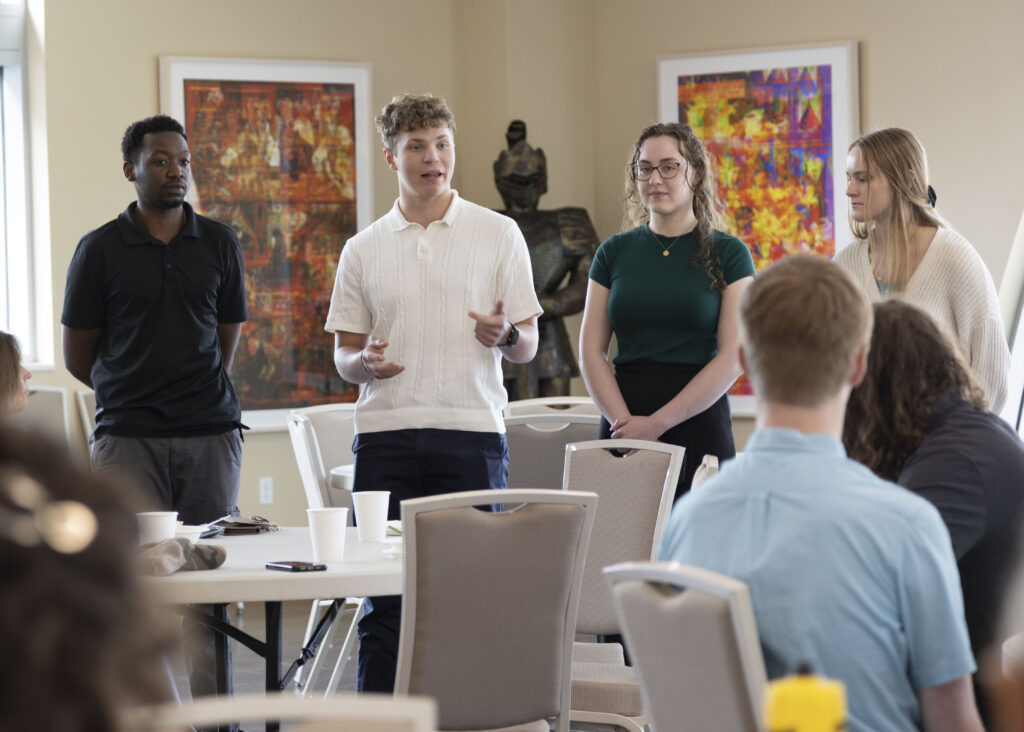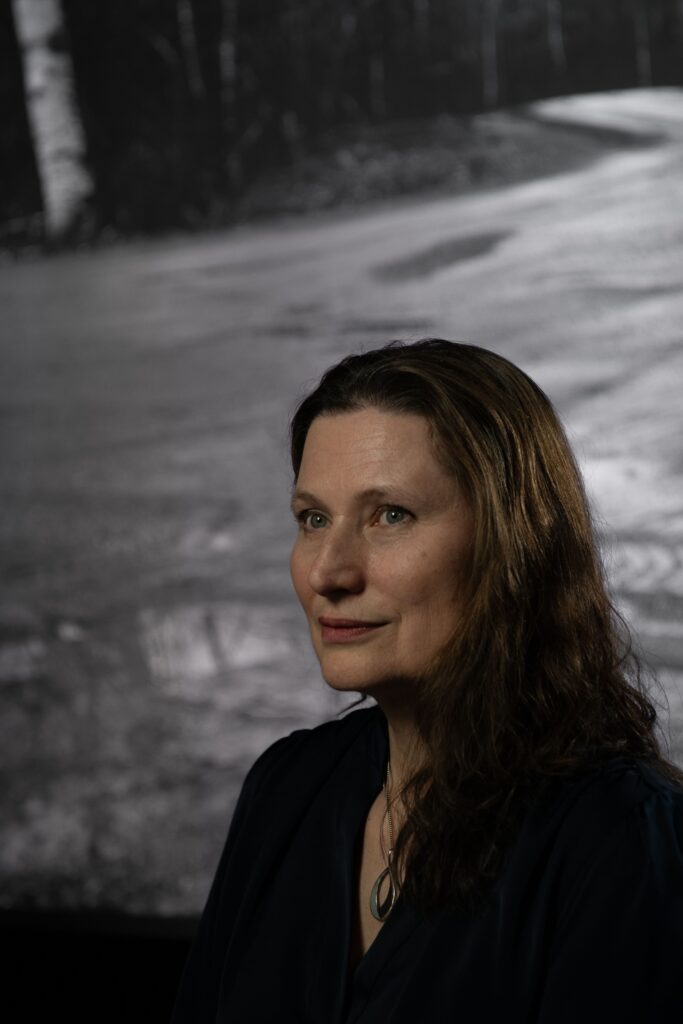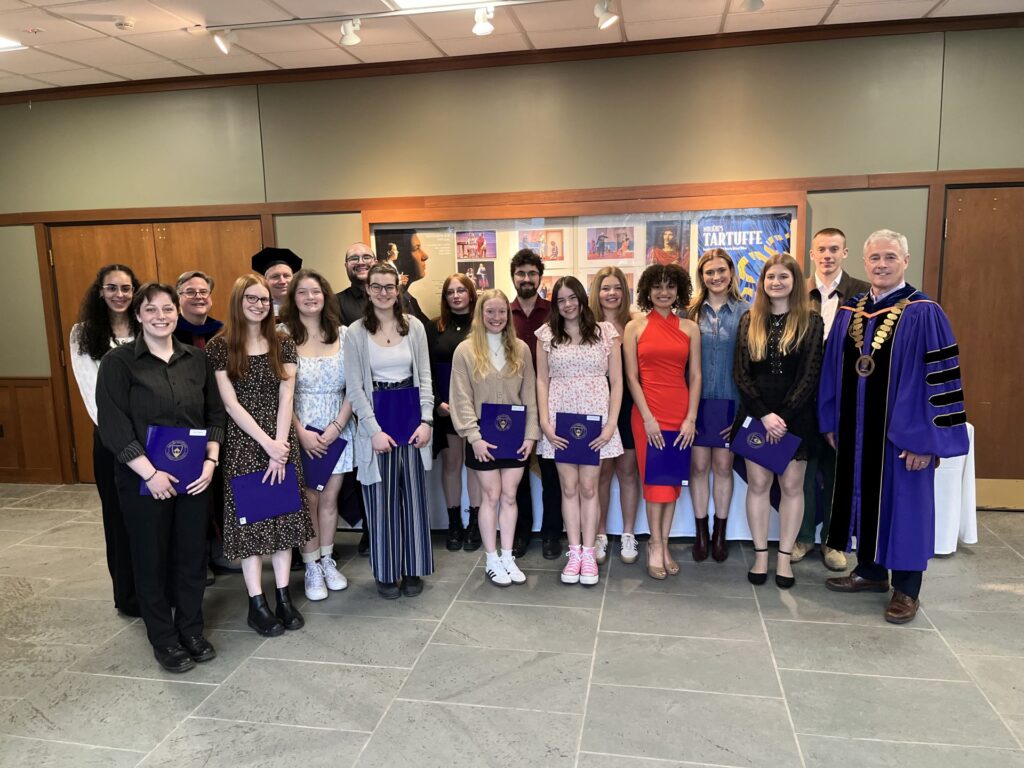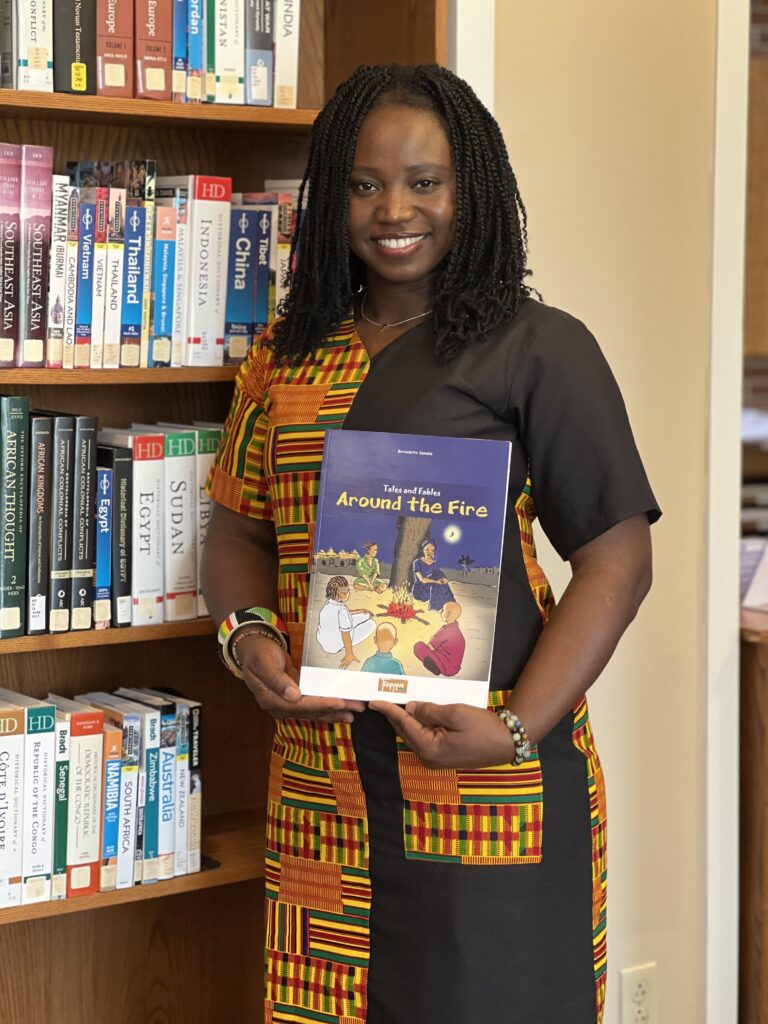Panelists connect memory care and service through different lenses
Two successful alumni and faculty scientist share about experiences relating to help for Alzheimer's patients and families
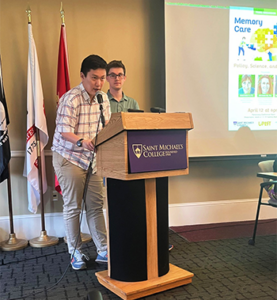
Student moderators for the panel were Jeson Li ’23 (speaking) and Nick Bliss ’23. (all photos by Elizabeth Murray ’13)
Saint Michael’s College hosted a panel with a faculty scientist and two accomplished alumni who explored the connection between service and memory care based on professional or personal experiences in the field — partly in recognition of National Volunteer Month.
Panelists during this free and public evening event in the Pomerleau Alumni Center on Thursday, April 12, were Megan Polyte ’97, M’10, policy director, Alzheimer’s Association, Vermont Chapter; Saint Michael’s Professor Ruth Fabian-Fine, Ph.D., director of the Neuroscience Program, associate professor of Biology and Neuroscience; and Andrea (Gamelli) Couture ’01, author of Embracing What Remains: A Memoir. Couture’s book describes her personal challenging family experiences encountering Alzheimer’s after her alumnus father, the late eminent surgeon Dr. Richard Gamelli ’70, received an Alzheimer’s diagnosis.
With service and impact at the heart of the Saint Michael’s College experience and mission, the panelists talked about ties they see between social engagement and memory. They also discussed how this connection ties to the work they currently do.
Sydney Rybicki 18M’21 of the Alumni & Family Engagement Office opened by noting that her office and the MOVE program were sponsoring the panel. Saint Michael’s seniors Jeson Li and Nick Bliss as the evening’s moderators then introduced the panel, inviting them to tell more about themselves and their work.
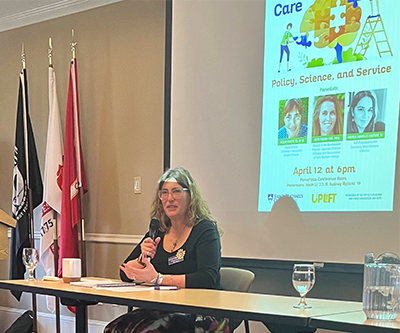
Megan Polyte ’97M’10 describes her work as policy director of the Alzheimer’s Association, Vermont Chapter.
The students told of their personal connections to memory care issues — both have helped run the Senior Games activities through MOVE, the volunteer arm of Edmundite Campus Ministry. Li said he grew up in a senior living home for about seven years so the experience is personal. Bliss spoke of his grandmother having Alzheimer’s and how he appreciated Middlebury College students who did activities with her in his younger days growing up in that Vermont community, “and I wanted to pay it back in my college years” — including his recent internship at Burlington’s Cathedral Square senior living spaces.
Panelists approached the evening’s topics through different lenses:
Polyte said a lot of her work is listening to what patients and families are going through and finding common themes to advance through policies in order to meet those needs. All three said a major part of their mission is destigmatizing dementia. “As long as it is hidden, folks don’t come out and get the services they need,” Polyte said.
Fabian-Fine viewed things through her scientific lens. He research focuses on neurodegenerative diseases, and she has been frustrated that in her field, Alzheimer’s research has seemed stalled for the last 30 years. It made her realize the pressing need to find model organisms to look at what is happening in brains at early stages of these diseases to find useful links to human brain structures — and her research at Saint Michael’s with spiders is doing that, she said, which is promising and exciting.
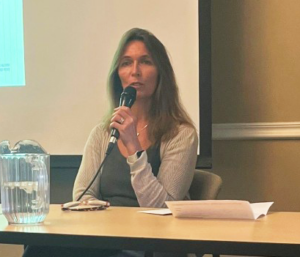
Ruth Fabian-Fine explains the science of neuro-degenerative disease.
Couture spoke of how important it was just to be able to tell her story so others can relate to it and learn from it, since she recounted finding no similar stories when she sought them upon her dad’s diagnosis. “It’s not just that I wrote my story, but that I shared my story,” she said.
The panelists took questions from the moderators and then audience. All agreed they saw important connections between social engagement and memory for dementia patients. Fabian-Fine said for her meaningful “social engagement” meant making sure others know how important things like sleep particularly are to our brains and their long-term health.
Gamelli gave examples in her family cases (her grandmother also was a dementia patient) of social engagement making a big difference – such as outings with family to see theater for her dad even when his disease was quite advanced, and the clear enjoyment it gave him.
A question on stigma and labels and how these affect people with Alzheimer’s led to panel responses of how families and patients are too often embarrassed by the diagnosis, which unfortunately delays them accessing resources that can make their lives significantly better. However, Fabian-Fine said she feels things are getting better in a growing understanding of the need to support and not stigmatize those with neurodegeneration, but rather communicate openly to bring support in the way people now seem to for cancer patients.
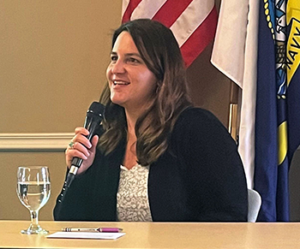
Andrea Gamelli Couture ’01 tells of her book about her alumnus dad’s journey with Alzheimer’s.
The panelists shared personal stories that motivate their work. “It’s the joy of being able to help people see the value they have in themselves as human beings and in expressing what they are experiencing, and how that helps on the policy level,” said Polyte. For Fabian Fine, “knowing we have the technology and ability to make progress on this — that’s what drives me.” Gamelli said she has been motivated particularly to increase awareness among doctors about Alzheimer’s, not just in their patients but also within their professional ranks.
Another question brought thoughts on solutions to bringing better care to impoverished areas without as many resources. Polyte spoke of the “gerontology desert” and said we need a 300 percent increase in gerontologists in Vermont. Fabian-Fine stressed how poorer families cannot afford to take off from work to stay home with memory care patients in their families, presenting a major stressful life challenge. Many women also care for children alongside a memory care patient at home, said Polyte, who speculated that perhaps more women suffer from dementia than men do, since their duties and lives might diminish their capacity for self-care to stave off dementia.
One questioner wondered how Vermont’s law on physician-assisted suicide might play out in dementia cases, and the panelists all said that such choices are not options under the current law in Vermont or elsewhere, given an incapacity for patients to decide or act on such a decision.

This wide shot from the panel presentation shows, from left, Polyte, Fabian-Fine and Couture.

